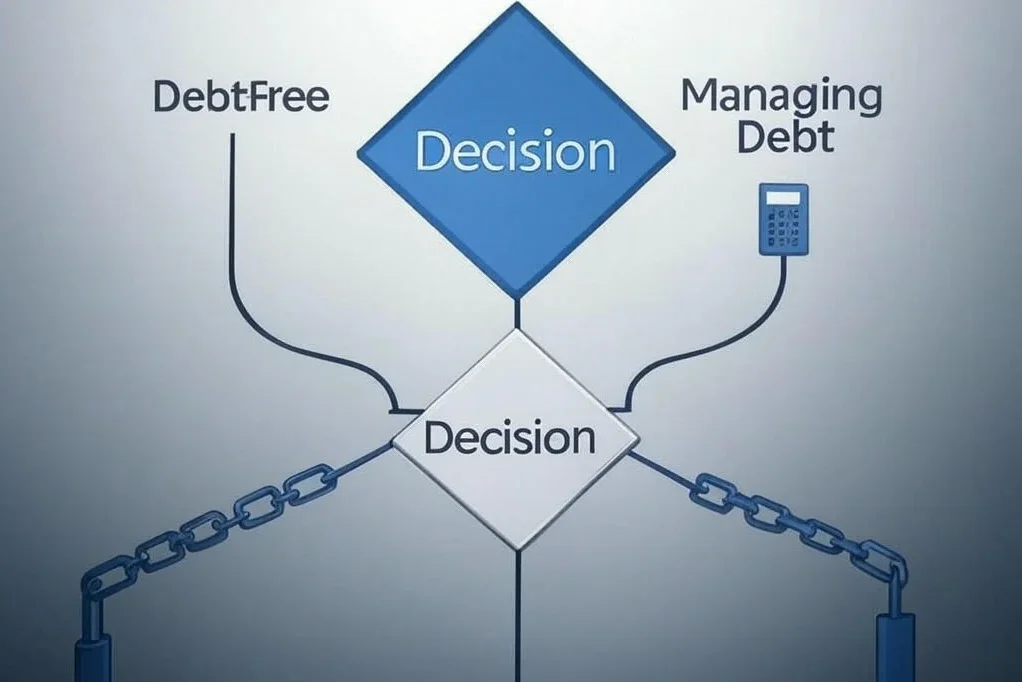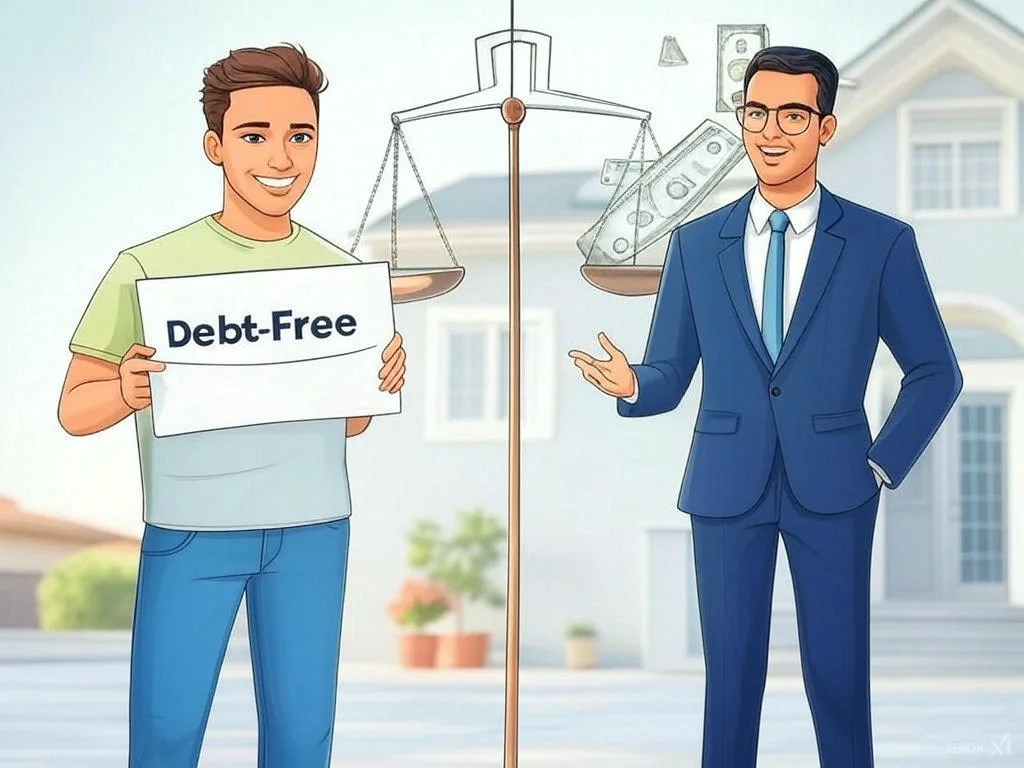Editor’s Note (2026 Update): I originally wrote this guide when interest rates were historic lows. The economic reality has changed. I have updated this post to reflect the “New Math” of 2026—where high-yield savings and higher borrowing costs change the rules of debt freedom.
Imagine lying awake at night, the weight of mounting bills pressing on your chest. Credit card statements pile up, each one more daunting than the last. Lena, a single mother of two, felt exactly this way. Overwhelmed by $20,000 in credit card debt, she wondered if she’d ever find relief.
You’re not alone if you’ve felt this kind of stress. The average American household carries record-high debt levels entering 2026. However, the game has changed: with credit card interest rates averaging over 22%, the cost of carrying that debt is significantly higher than it was just a few years ago. While some strive for debt-free living, others leverage debt to build wealth. So, is it better to be debt-free or use debt strategically? Let’s explore this complex question to help you make informed financial decisions in 2026.
Contents
- 1 Why Debt-Free Living vs. Debt Matters
- 2 The Mortgage Exception: 3% vs. 7% Rates
- 3 How to Decide: Is It Better to Be Debt-Free or Have Debt? Step-by-Step
- 4 Common Mistakes to Avoid with Debt-Free Living vs. Debt
- 5 Summary Table: When to Focus on Debt Repayment vs. Investing
- 6 Frequently Asked Questions
- 6.1 How Does Savings vs. Debt Impact Debt-Free Living?
- 6.2 Is It Better to Be Debt-Free or Invest?
- 6.3 Does Being Debt-Free Truly Bring You Peace?
- 6.4 How to Become Debt-Free on a Low Income?
- 6.5 Is It Better to Be Debt-Free or Have a Mortgage?
- 6.6 Is it better to pay off a 6% mortgage or invest in 2026?
- 6.7 Psychological and Lifestyle Benefits of Being Debt-Free
- 7 Real-Life Examples of Investment vs. Debt Repayment
- 8 Interactive Tools for Your Financial Journey
- 9 Expand Your Knowledge
- 10 Ready to Take Control of Your Financial Future?
🚀 Quick Decision: The 2026 Rule of Thumb
- Debt Rate < 4%: Pay minimums. Invest the rest (Math wins).
- Debt Rate 4% – 7%: The “Grey Zone.” Do what helps you sleep better (Psychology wins).
- Debt Rate > 7%: Pay it off ASAP. The guaranteed return is too good to ignore.
Why Debt-Free Living vs. Debt Matters
In 2026, understanding the financial implications of debt is more crucial than ever. With fluctuating interest rates, evolving economic landscapes, and diverse investment opportunities, your approach to debt can significantly impact your financial future.
The Investment Landscape
With numerous investment options available, many are asking, “Is it better to be debt-free or invest?” Let’s compare common investment vehicles, keeping in mind that past performance doesn’t guarantee future results.
Investment Options vs. Debt Interest Rates
| Investment Option | Average Annual Return (Historical) | Inflation-Adjusted Return | Liquidity | Risk Level |
|---|---|---|---|---|
| Savings Account | ~3.8% – 4.2% (High-Yield Savings) | Negative (after inflation) | High | Low |
| Government Bonds | 2% – 3% | ~0% | Medium | Low |
| Corporate Bonds | 4% – 6% | 1% – 3% | Medium | Medium |
| Real Estate | 6% – 8% | 3% – 5% | Low | Medium |
| Index Funds | 7% – 10% | 4% – 7% | High | Medium to High |
| Stocks (S&P 500) | ~10% | ~7% | High | High |
| Credit Card Debt | -20% to -29% (Average ~22%) | N/A | N/A | N/A |
💡 Pro Tip: Don’t Forget the Tax Man.
When you earn 4% in a savings account, you pay taxes on that interest, lowering your real return to ~3%. When you pay off a 6% debt, that is a guaranteed, tax-free 6% return. In 2026, the tax-free certainty of debt payoff often wins.
Note: Negative returns for credit card debt indicate money paid out as interest. Inflation is assumed to be around 3% annually.
Remember: Investments carry risks, and market volatility can lead to losses. Always consider your personal risk tolerance.
The Mortgage Exception: 3% vs. 7% Rates
Homeownership remains a cornerstone of financial stability. But “Is it better to be debt-free or have a mortgage?” Let’s explore how keeping a mortgage can be financially beneficial.
Case Study: Emma’s Strategic Mortgage
Emma, who bought her home years ago, locked in a 3.5% fixed rate. For her, investing makes sense. However, compare this to Liam, a 2026 buyer with a 6.5% mortgage. For Liam, paying down the mortgage offers a guaranteed 6.5% return—often beating the stock market after taxes and risk. After adjusting for inflation, her investment yields about 4%. Over 15 years, Emma’s investment grows significantly, outpacing the interest saved from paying off her mortgage early.
When Paying Off a Mortgage Early Makes Sense:
- Nearing Retirement: Reducing fixed expenses provides financial security.
- Unstable Income: Eliminating debt can alleviate financial stress during uncertain times.
- High-Interest Loans: If mortgage rates are high (e.g., above 5-6%), paying off early may save money.
Psychological & Lifestyle Benefits of Being Debt-Free
Does being debt-free truly bring you peace? Financial security significantly impacts mental health. A study published in the Journal of Social Science & Medicine (2023) found that individuals without debt reported 24% lower stress levels and improved overall well-being.
- Expert Quote: “Eliminating debt can lift a significant psychological burden, leading to better mental health and life satisfaction.” — Dr. Lisa Morris, Financial Psychologist
How to Decide: Is It Better to Be Debt-Free or Have Debt? Step-by-Step
Navigating the debt landscape doesn’t have to be daunting. Here’s a comprehensive guide to help you make smarter financial choices.
Step 1: Assess Your Financial Health
- Calculate Your Debt-to-Income Ratio:
- Divide your total monthly debt payments by your gross monthly income.
- A ratio above 36% may indicate financial strain.
- List All Debts and Interest Rates:
- Prioritize high-interest debts like credit cards with rates of 15% or higher.
- Evaluate Savings and Investments:
- Ensure you have an emergency fund covering 3–6 months of expenses.
Step 2: Prioritize High-Interest Debt
Ignoring high-interest debt leads to unnecessary financial strain.
- Pay Off Credit Card Debt First:
- High interest can quickly inflate your balance.
- Consider Debt Consolidation:
- Use personal loans to lower your interest rates.
Step 3: Balance Savings vs. Debt Repayment
Savings vs. Debt: Is it better to save money or pay debt?
- Build an Emergency Fund:
- Set aside funds to avoid accruing more debt during unexpected events.
- Automate Savings:
- Regular contributions grow over time through compound interest.
Step 4: Evaluate Investment Opportunities
“Is it better to be debt-free or invest?”
- Compare Interest vs. Returns:
- In the ‘cheap money’ era, returns often beat debt interest. In 2026, the math is tighter. Ensure your after-tax investment return truly beats your guaranteed debt savings.
- Consider Market Downturn Risks:
- Market Volatility: Economic recessions can lead to investment losses.
- Risk Scenario: Jacob, who invested instead of paying off his student loans, lost significant funds during a market crash. His loan interest accumulated, leaving him worse off than before.
Disclaimer: Market returns (like the S&P 500) are averages over decades, not guarantees for next year. Debt interest, however, is mathematically guaranteed.
Risk Management Strategies
- Diversification: Spread investments across various asset classes to mitigate risk.
- Dollar-Cost Averaging: Invest a fixed amount regularly to reduce the impact of volatility.
- Consult a Financial Advisor: Tailor strategies to your risk tolerance and financial goals.
Step 5: Re-examine the Mortgage Exception
“Is it better to be debt-free or have a mortgage?”
- Leverage Low Interest Rates:
- Mortgages often have lower rates than other debts.
- Tax Benefits:
- Mortgage interest payments may be tax-deductible.

Common Mistakes to Avoid with Debt-Free Living vs. Debt
Avoiding common pitfalls can set you on the path to financial success.
Mistake 1: Neglecting Investment Opportunities
Focusing solely on debt repayment might cause you to miss out on lucrative investments. Ignoring investments leads to lost potential gains.
- Example: Paying off a student loan at 5% interest instead of investing in real estate yielding an 8% annual return (5% after inflation).
Mistake 2: Overlooking the Importance of Savings
- Skipping Emergency Savings:
- Without a cushion, unexpected costs could push you deeper into debt.
- Balanced Strategy:
- Allocate funds to both savings and debt repayment for stability.
Mistake 3: Misunderstanding Investment Risks
- Market Downturn Risks:
- Economic recessions can lead to significant investment losses.
- Risk Scenario: Maria focused on investing while carrying high-interest credit card debt. A market slump wiped out her gains, but her debt continued to grow due to compound interest.
- Personal Risk Tolerance:
- Some prefer peace of mind over potential higher returns.
Risk Mitigation Strategies
- Diversification
- Dollar-Cost Averaging
- Regular Portfolio Reviews
Mistake 4: Misinterpreting the Mortgage Exception
Paying off your mortgage early isn’t always the best move. Consider the mortgage exception and potential benefits before making a decision.
- Opportunity Cost:
- Extra payments could be invested for higher returns elsewhere.
- Emotional Factors:
- If debt causes significant stress, paying off the mortgage may be beneficial despite financial logic.
Summary Table: When to Focus on Debt Repayment vs. Investing
| Financial Situation | Best Approach | Why |
|---|---|---|
| High-Interest Debt (Credit Cards) | Pay Off Debt | Interest outweighs potential investment returns |
| Low-Interest Mortgage | Invest | Potential for higher inflation-adjusted ROI |
| No Emergency Fund | Build Savings | Avoid falling into more debt during crises |
| Stable Income & Low Debt | Invest Aggressively | Accelerate wealth-building efforts |
| Approaching Retirement | Reduce Debt | Lower expenses for fixed-income period |
| Uncertain Job Security | Save More, Pay Down Debt | Prepare for potential income loss |
| Risk-Averse Personality | Pay Off Debt | Peace of mind over potential higher returns |
Frequently Asked Questions
How Does Savings vs. Debt Impact Debt-Free Living?
Balancing savings and debt is crucial. A solid savings cushion can prevent future debt and provide financial security during emergencies.
Is It Better to Be Debt-Free or Invest?
It depends on your financial situation and risk tolerance. If potential investment returns, after inflation, are higher than your debt interest rates—and you’re comfortable with market risks—investing might be smarter.
Does Being Debt-Free Truly Bring You Peace?
For many, eliminating debt reduces stress and improves mental health. Lena’s story illustrates how paying off debt can lead to better sleep, less anxiety, and overall happiness.
How to Become Debt-Free on a Low Income?
Budget Strictly: Use apps like Mint or You Need A Budget (YNAB) to track expenses.
Increase Income: Consider side hustles like freelancing or gig economy jobs.
Apply the Debt Snowball Method: Pay off the smallest debts first to gain momentum.
Is It Better to Be Debt-Free or Have a Mortgage?
Holding a mortgage can be beneficial due to low interest rates and tax deductions. However, if you’re nearing retirement or have an unstable income, paying off your mortgage might provide financial security.
Is it better to pay off a 6% mortgage or invest in 2026?
With mortgage rates around 6-7%, paying off the mortgage is often safer. It offers a guaranteed, tax-free return that rivals stock market averages, without the risk of volatility.
Psychological and Lifestyle Benefits of Being Debt-Free
Being debt-free doesn’t just impact your wallet—it can transform your life.
- Reduced Stress Levels:
- Debt can lead to anxiety and depression. Eliminating it can improve mental health.
- Increased Freedom:
- Without debt obligations, you have more flexibility to pursue passions, change careers, or travel.
- Improved Relationships:
- Financial strain often affects personal relationships. Debt-free living can alleviate these pressures.
Scientific Insight: “Financial stress is a significant predictor of marital dissatisfaction and divorce.” — Journal of Family and Economic Issues (2024)
Real-Life Examples of Investment vs. Debt Repayment
Michael’s Story: Using Debt for Wealth-Building
Michael, a 40-year-old entrepreneur, took out a low-interest loan to invest in rental properties. Despite market fluctuations, over 10 years, his properties appreciated, and rental income provided a steady cash flow. His investment, adjusted for inflation, outpaced the interest on his loan.
Lena’s Journey: Overcoming Credit Card Debt
Lena felt overwhelmed by $20,000 in credit card debt with interest rates exceeding 20%. The debt affected her sleep, health, and relationships. By following a strict budget and using the debt avalanche method (focusing on highest-interest debts first), she paid off her debt in four years. The relief was immediate—she slept better, felt happier, and could focus on her children’s future.
Jacob’s Risk Scenario: When Debt Repayment Is Better
Jacob chose to invest in the stock market instead of paying off his student loans at a 6% interest rate. A market downturn caused his investment portfolio to lose 15% of its value. Meanwhile, interest on his student loans accumulated, leaving him in a worse financial position. In hindsight, focusing on debt repayment would have been the safer choice given his moderate risk tolerance.
Interactive Tools for Your Financial Journey
Enhance your decision-making process with these interactive tools:
- Debt Repayment vs. Investing Calculator
- Financial Health Quiz: Take the Quiz
- Free Financial Checklist: Get Your Copy
Expand Your Knowledge
Want to learn more about investing while managing debt? Read our guide on Smart Budgeting Strategies for Financial Success.
Interested in how mortgages fit into your financial plan? Check out The Mortgage Decision: Should You Pay It Off Early?.
Ready to Take Control of Your Financial Future?
Your financial journey is unique, and making informed decisions is key to achieving your goals.
Start your debt-free journey now with our free checklist! Download it here and take the first step toward financial freedom today.
Bold Key Terms for Scannability:
- Past performance doesn’t guarantee future results.
- Ignoring investments leads to lost potential gains.
- Savings vs. Debt: Is it better to save money or pay debt?
- Consider the mortgage exception
- Risk Tolerance Levels
- Market Downturn Risks
References:
- Federal Reserve. (2023). Report on the Economic Well-Being of U.S. Households.
- Northwestern Mutual. (2023). Planning & Progress Study.
- Journal of Social Science & Medicine. (2023). The Impact of Debt on Mental Health.
- Journal of Family and Economic Issues. (2024). Financial Stress and Marital Outcomes.
Your financial future is in your hands. Make 2026 the year you take control and thrive!
Disclaimer: This article is for informational purposes only and does not constitute financial advice. Please consult a financial advisor for advice tailored to your personal circumstances.

👋 Hi, I’m Jaiveer Hooda, the content creator behind Grow Your Money Smart!
I’m passionate about exploring the world of personal finance and sharing actionable insights to help you manage debt, plan for a secure retirement, and create passive income streams. 💡 My goal is to simplify complex financial topics and empower you to make smarter money decisions.
Let’s grow your wealth together, one smart move at a time! 💸
